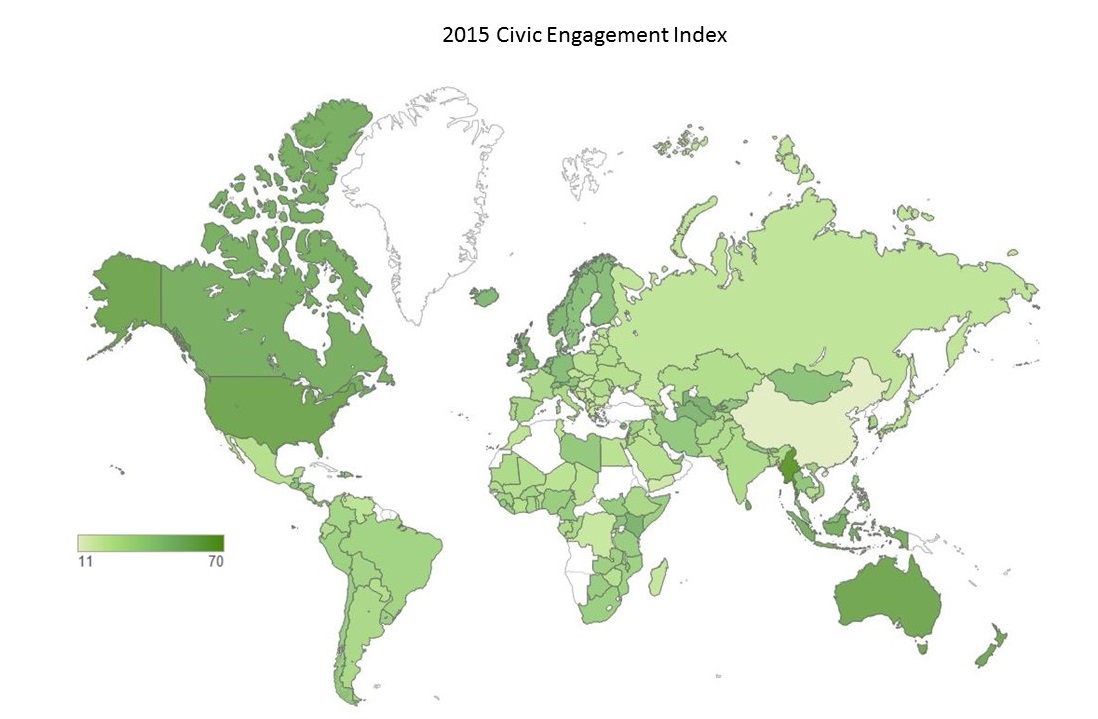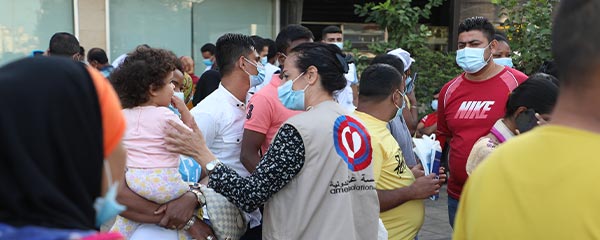Story Highlights
- 44% worldwide say they helped a stranger in the past month
- 27% donated money to a charity
- 20% volunteered their time to an organization
WASHINGTON, D.C. -- Billions of people worldwide are giving back to their communities, according to a new report based on Gallup surveys in 140 countries in 2015. This giving most often comes in the form of helping a stranger in need (44%) rather than donating money to a charity (27%) or volunteering time to an organization (20%). Projected to the entire adult population of the world, these percentages translate into approximately 2.2 billion people helping a stranger in need, nearly 1.4 billion donating money and almost 1 billion volunteering time.

Individually, these questions help governments, businesses and organizations better understand the population of potential volunteers. But considered together, people's answers to these questions help measure their commitment to the communities they live in. Gallup compiles the "positive" responses to these three questions into a Civic Engagement Index score for each country. The higher the score, the higher the proportion of the population that is civically engaged and inclined to give back to their communities.
Engagement Highest in Myanmar
Country scores range widely throughout the world, from a high of 70 in Myanmar -- which also led the world on this metric in 2014 -- to a low of 11 in China. Myanmar's strong Buddhist traditions, which stress donating to and volunteering at temples, are reflected in residents' positive responses to each of the civic engagement questions. Majorities in Myanmar said "yes" to each question, with a global high of 91% saying they had donated money to a charity in the past month.
| Index Score | |||||||||||||||||||||||||||||||||||||||||||||||||||||||||||||||||||||||||||||||||||||||||||||||||||
|---|---|---|---|---|---|---|---|---|---|---|---|---|---|---|---|---|---|---|---|---|---|---|---|---|---|---|---|---|---|---|---|---|---|---|---|---|---|---|---|---|---|---|---|---|---|---|---|---|---|---|---|---|---|---|---|---|---|---|---|---|---|---|---|---|---|---|---|---|---|---|---|---|---|---|---|---|---|---|---|---|---|---|---|---|---|---|---|---|---|---|---|---|---|---|---|---|---|---|---|
| Myanmar | 70 | ||||||||||||||||||||||||||||||||||||||||||||||||||||||||||||||||||||||||||||||||||||||||||||||||||
| United States | 61 | ||||||||||||||||||||||||||||||||||||||||||||||||||||||||||||||||||||||||||||||||||||||||||||||||||
| Australia | 60 | ||||||||||||||||||||||||||||||||||||||||||||||||||||||||||||||||||||||||||||||||||||||||||||||||||
| New Zealand | 59 | ||||||||||||||||||||||||||||||||||||||||||||||||||||||||||||||||||||||||||||||||||||||||||||||||||
| Sri Lanka | 57 | ||||||||||||||||||||||||||||||||||||||||||||||||||||||||||||||||||||||||||||||||||||||||||||||||||
| Canada | 56 | ||||||||||||||||||||||||||||||||||||||||||||||||||||||||||||||||||||||||||||||||||||||||||||||||||
| Indonesia | 56 | ||||||||||||||||||||||||||||||||||||||||||||||||||||||||||||||||||||||||||||||||||||||||||||||||||
| United Kingdom | 54 | ||||||||||||||||||||||||||||||||||||||||||||||||||||||||||||||||||||||||||||||||||||||||||||||||||
| Ireland | 54 | ||||||||||||||||||||||||||||||||||||||||||||||||||||||||||||||||||||||||||||||||||||||||||||||||||
| Uzbekistan | 52 | ||||||||||||||||||||||||||||||||||||||||||||||||||||||||||||||||||||||||||||||||||||||||||||||||||
| Gallup World Poll, 2015 | |||||||||||||||||||||||||||||||||||||||||||||||||||||||||||||||||||||||||||||||||||||||||||||||||||
Although Gallup finds a strong connection between the Civic Engagement Index and per capita GDP, the countries with the most civically engaged populations in the world are not necessarily the richest. Myanmar's place at the top is evidence of that. While the list of the top 10 countries does include wealthy Western countries where residents may be better positioned to give -- such as the U.S., Australia, New Zealand and Canada -- middle-income countries such as Sri Lanka and Indonesia are not far behind. In fact, residents in the middle-income countries at the top of the list are more likely than residents in any Western nation to say they have volunteered their time to an organization in the past month.
Engagement Lowest in China
Some of the countries and territories where populations are the least civically engaged are those that have suffered from economic and political upheaval, such as Yemen, the Palestinian Territories, Greece and the Democratic Republic of the Congo. However, civic engagement levels continue to be among the lowest in the world in economic powerhouse China, with a score of 11 in 2015.
| Index Score | |||||||||||||||||||||||||||||||||||||||||||||||||||||||||||||||||||||||||||||||||||||||||||||||||||
|---|---|---|---|---|---|---|---|---|---|---|---|---|---|---|---|---|---|---|---|---|---|---|---|---|---|---|---|---|---|---|---|---|---|---|---|---|---|---|---|---|---|---|---|---|---|---|---|---|---|---|---|---|---|---|---|---|---|---|---|---|---|---|---|---|---|---|---|---|---|---|---|---|---|---|---|---|---|---|---|---|---|---|---|---|---|---|---|---|---|---|---|---|---|---|---|---|---|---|---|
| Azerbaijan | 21 | ||||||||||||||||||||||||||||||||||||||||||||||||||||||||||||||||||||||||||||||||||||||||||||||||||
| Madagascar | 20 | ||||||||||||||||||||||||||||||||||||||||||||||||||||||||||||||||||||||||||||||||||||||||||||||||||
| Montenegro | 20 | ||||||||||||||||||||||||||||||||||||||||||||||||||||||||||||||||||||||||||||||||||||||||||||||||||
| Hungary | 20 | ||||||||||||||||||||||||||||||||||||||||||||||||||||||||||||||||||||||||||||||||||||||||||||||||||
| Serbia | 20 | ||||||||||||||||||||||||||||||||||||||||||||||||||||||||||||||||||||||||||||||||||||||||||||||||||
| Congo (Kinshasa) | 19 | ||||||||||||||||||||||||||||||||||||||||||||||||||||||||||||||||||||||||||||||||||||||||||||||||||
| Greece | 19 | ||||||||||||||||||||||||||||||||||||||||||||||||||||||||||||||||||||||||||||||||||||||||||||||||||
| Yemen | 17 | ||||||||||||||||||||||||||||||||||||||||||||||||||||||||||||||||||||||||||||||||||||||||||||||||||
| Palestinian Territories | 17 | ||||||||||||||||||||||||||||||||||||||||||||||||||||||||||||||||||||||||||||||||||||||||||||||||||
| China | 11 | ||||||||||||||||||||||||||||||||||||||||||||||||||||||||||||||||||||||||||||||||||||||||||||||||||
| Gallup World Poll, 2015 | |||||||||||||||||||||||||||||||||||||||||||||||||||||||||||||||||||||||||||||||||||||||||||||||||||
China's low score illustrates that philanthropy is not yet a part of daily life for many Chinese, despite their increasing wealth. This is not to say that Chinese are not generous -- they reportedly donated billions in goods and services after the deadly 2008 earthquake in China's Sichuan province. That same year, 17% of Chinese reported donating money to a charity in the past month. However, a string of scandals involving charitable organizations since then, along with the economic downturn, have hurt charitable donations. In 2015, just 6% of Chinese reported donating money to a charity in the past month.
A new law that eases restrictions on charitable organizations' fundraising, but also includes strict regulations to prevent fraud, took effect in China in September 2016. This legislation may help alleviate some concerns among Chinese and encourage more businesses and individuals to donate to charities.
Implications
Encouraging citizens to share responsibility for the problems facing their communities and getting them to participate in solving them is arguably one of the most important tasks for global leaders in the years to come.
Gallup's data on charitable giving worldwide show that billions of people are already doing this. But the challenge for leaders lies in understanding and harnessing the energy that moves some citizens to participate and in removing the barriers that keep others from doing so. Leaders must crack the code on what motivates some individuals to give incredible amounts of their time, effort and talent -- most times without pay and often at great risk -- to benefit people they don't know and perhaps will never see again.
Jesus Rios contributed to this article.
Survey Methods
These results are based on telephone and face-to-face interviews with approximately 1,000 adults per country, aged 15 and older, conducted throughout 2015 in 140 countries. For results based on the total sample of national adults, the margin of sampling error ranges from ±2.0 percentage points to ±5.6 percentage points at the 95% confidence level. All reported margins of sampling error include computed design effects for weighting.
For more complete methodology and specific survey dates, please review Gallup's Country Data Set details.
Learn more about how the Gallup World Poll works.
